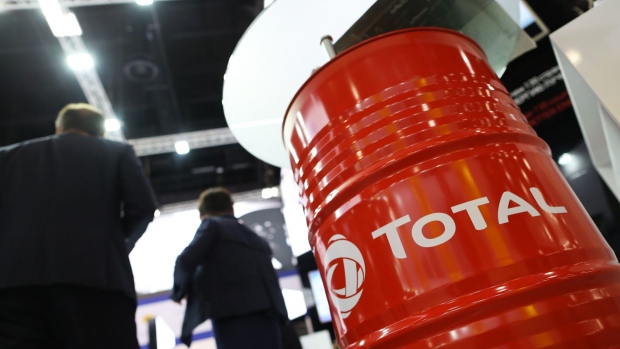Apr 26, 2019
Total’s Cash Flow Rises on Record Oil and Gas Output
, Bloomberg News

(Bloomberg) -- Total SA boosted cash flow in the first quarter as record hydrocarbon output and soaring sales of liquefied natural gas compensated for a drop in crude prices.
The French energy giant’s earnings are the latest sign of the industry’s recovery from a deep downturn, with Total benefiting from the start of giant liquefied natural gas projects from Australia to the Arctic and offshore oil fields in West Africa. Thanks to cost cuts and improvements in efficiency, the company can thrive even as global markets remain volatile, said Chief Executive Officer Patrick Pouyanne.
Total’s cash flow, which is closely watched by investors as a measure of oil majors’ ability to keep paying generous dividends and investing in growth, was lifted by “the ramp-up of highly cash-generative projects,” Pouyanne said in a statement on Friday.
Operating cash flow before working-capital changes rose to $6.03 billion from $5.37 billion a year earlier, the company based near Paris said. Adjusted net income fell 4.3 percent to $2.76 billion, just below the $2.78 billion median analyst estimate, due in part to the impact of rising U.S. interest rates on the cost of servicing debt.
For a more detailed breakdown of Total’s earnings, click here.
Thanks to good operational performance and continued cost discipline, Total would have been able to cover its expenditures before dividend payments with oil as low as $25 a barrel, Pouyanne said. Brent crude, the international benchmark, rose above $75 on Thursday.
Total’s LNG sales doubled to 7.7 million tons in the first quarter, thanks to last year’s acquisition of Engie SA assets, the startup of the Ichthys project in Australia, and the ramp-up of the Yamal plant in Russia. To cement future growth, the company recently took a stake in the Arctic LNG 2 project in Russia, reinforced its commitment in Tellurian Inc.’s project in the U.S., and made progress on a venture in Papua New Guinea.
The company’s oil and gas production climbed 9 percent to a record 2.946 million barrels equivalent a day in the first quarter, boosted by the start of offshore fields in Nigeria and Angola, plus the acquisition of assets such as Maersk Oil. Total reiterated its target of raising output by more than 9 percent this year.
Big Oil has faced a volatile environment in recent months, with Brent falling from a four-year high of more than $86 a barrel in October to $50 at the end of December. The benchmark has bounced back again as crises in Libya and Venezuela, and tougher U.S. sanctions on Iran fuel supply fears.
Total reiterated plans to keep net investments at $15 billion to $16 billion this year, little changed from 2018. It bought back about $350 million of its shares in the first quarter, part of its $1.5 billion buyback target for 2019. As planned, it increased its dividend by 3.1 percent to 0.66 euros ($0.73) a share.
To contact the reporter on this story: Francois de Beaupuy in Paris at fdebeaupuy@bloomberg.net
To contact the editor responsible for this story: James Herron at jherron9@bloomberg.net
©2019 Bloomberg L.P.


